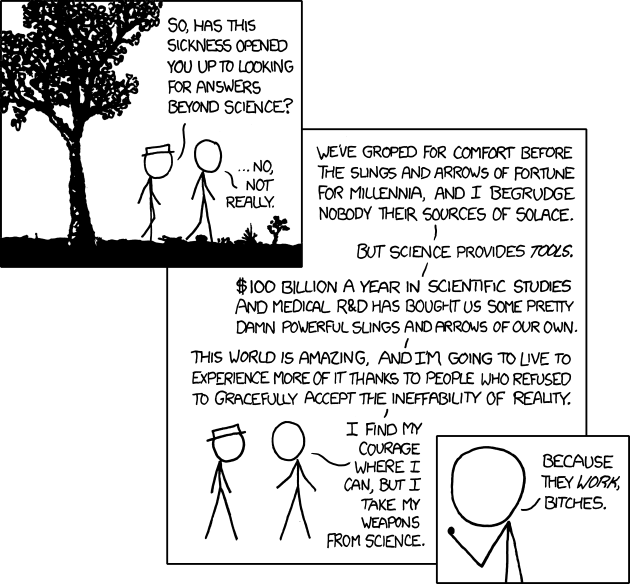A comic about finding answers when dealing with serious illness was posted on xkcd recently. One of my brothers was recently in the hospital for a while and I have been thinking about him. I like the comic.
I have bipolar disorder and I didn't get treatment until four years after onset, and I think about what I made of my illness before I got a diagnosis. Now that I'm getting appropriate care, pills help, but the other half of my treatment is cognitive, and most of that is getting information from my mood about how to keep myself well. It used to be that if I felt guilty, apropos of nothing, I would first think seriously and sternly about whether I'd done anything bad lately, and, if not, judge myself according to impossible ideals, fretting about God or social justice or fame or what is necessary to live a meaningful life. Now, when I feel guilty and it's not obvious why, I first ask myself if I need a snack or a nap or to take a walk; I think it's important to save guilt for actual sin. I certainly don't expect my mood to tell me anything new or constructive about spirits. I used to interpret my confusing mood fluctuations as information about what's out there, in the cosmos or in the heavens, but now, when my mood confuses me, I look for information about what's going on inside of me, and the second pattern works better.
When I got the message at 1:30 AM that my brother was in the hospital, I didn't speculate about why God would will such a thing, or why he would allow it, or what my brother was supposed to learn from his hardship. Instead, what's been meaningful to me is seeing how loving and supportive my family can be, and how resilient and patient and funny my brother is. I don't want to look for what lessons I'm "supposed to learn", I want to make my own lessons out of the experiences I have.
I remember hearing a story on NPR regarding the role of psychologists in relief work, responding to the earthquake in Haiti. A lot of psychologists evidently planned on showing up and sitting victims down on the proverbial couch and talking with them about the traumas they've faced. Instead, they were put to work helping people find family members and connecting them with resources to get necessities, like shelter and clean water: to help disaster victims have healthier minds, acting like a social worker seems to be more helpful than acting like an analyst. The talk therapy is important, but it comes later.
I like science because my job holds me in tension between concrete, observable facts, and the fact that scientific knowledge is always changing; what we know is reliable but we're always learning surprising new things.
When I'm suffering, I want support from my religious friends, I'm happy that they pray for me, because it's good to know that I'm cared for. I don't want them turning this into an opportunity to try to make me reconsider something that I've reconsidered a thousand times and have finally settled in my mind. When my religious friends suffer, rather than thinking of God as a source of answers, I hope that they look at their God and are inspired by his love, and, remembering that God is incomprehensibly big, remain open to their suffering having no perceivable meaning. I would rather that they not expect their suffering to have a built-in meaning that we can discover in our lifetimes. The best religious impulses are humble and loving; I hope that my religious friends can be open to seeing suffering as ambiguous, and that they can find meaning first by courageously overcoming their challenges.
I mean, yes idealism, yes the dignity of pure research, yes, the pursuit of truth in all its forms, but there comes a point I'm afraid where you begin to suspect that if there's any real truth it's that the entire multi-dimensional infinity of the Universe is almost certainly being run by a bunch of maniacs; and if it comes to a choice between spending another ten million years finding that out and on the other hand just taking the money and running, I for one could do with the exercise.
—Frankie the mouse, The Hitchhiker's Guide to the Galaxy, Douglas Adams

No comments:
Post a Comment